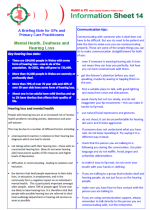WaMH in PC's blog
Easing Appointment Contact For People With Hearing Loss

Action on Hearing Loss has discovered a significant percentage of these kinds of patients face significant problems when trying to use mental health services.
There are 534,000 people in Wales with some form of hearing loss and they are at an increased risk of mental health problems including anxiety, depression and poor self-esteem so it's an issue which GPs and primacy care practitioners really need to understand.
A simple thing services can offer is a range of contact methods for patients to make an appointment - including the use of email, text messaging and textphones.
If you put these contact options in place then they must be advertised to patients and most are fairly easy to put in place.
Text - or SMS - messaging can be offered by simply offering a textphone number to patients with hearing loss and making sure the mobile phone which takes the messages is monitored throughout the day.
The same internal procedures should be used to monitor similar email services, particularly to ensure that this channel can be used to secure same day appointments for deaf people.
In the longer term, healthcare services should explore the use of an online appointment booking system and telephone systems should be designed with Text Relay users in mind, as automated responses take time to relay which can disadvantage patients calling between fixed times to secure same-day appointments.
These are just some of the way mental health services can be made more accessible to people with hearing loss and you can find out more by reading our latest Information Sheet 14.
Alternatively, we'll be going into more details about how you can improve your communications within your surgeries and clinics with a fnial post on this subject on Friday.
If you have any questions about Information Sheet 14 or any other queries please contact our Project Manager Lesley Hills via email at lhills@rcgp.org.uk or on 029 2050 4516.
How To Open Up Health Services For Deaf People

Action on Hearing Loss has discovered a significant percentage of these kinds of people face significant problems when trying to use mental health services.
There are 534,000 people in Wales with some form of hearing loss and they are at an increased risk of mental health problems including anxiety, depression and poor self-esteem.
By 2031 the number of people with hearing problems is set to grow to 725,000 so it is a subject which GPs and primacy care practitioners across the country really need to understand.
As a result it is up to mental health workers to help make these services more accessible to this group and this can be achieved through a series of simple processes such as:
-
Asking patients for details about their preferred method of communication when they first join a new GP or healthcare service
-
Introducing a ‘flagging’ system on patients’ computer records to allow healthcare workers to understand any specific needs the patient may have when they visit a service and passing on this information for onward referrals
- Introducing procedures to ensure the individual communication support needs of patients are met - including booking a suitable communication professional such as a Sign Language Interpreter or Lipspeaker
These are just some of the way mental health services can be made more accessible to people with hearing loss and you can find out more by reading our latest Information Sheet 14.
Alternatively, we'll be going into more details about how you can improve your communications with deaf people with some more blog posts later this week.
If you have any questions about Information Sheet 14 or any other queries please contact our Project Manager Lesley Hills via email at lhills@rcgp.org.uk or on 029 2050 4516.
Improving Mental Health For People With Hearing Loss

Action on Hearing Loss has discovered that a significant percentage of people with hearing loss faced problems when trying to use these kinds of services.
Recent research carried out by the organisation - formerly known as the RNID - found that:
- 35% experienced difficulty communicating with their GP or practice nurse
- 15% avoid going to see their GP because of communication problems with this proportion doubling among British Sign Language (BSL) users
- 35% of the deaf and hard of hearing had been left unclear about their condition because of communication problems with their GP or practice nurse
- 24% of patients missed appointments because of poor communication including not being able to hear staff calling out their name
The findings raise the issue of how mental health problems are detected amongst deaf people - especially at an early stage - and how they are referred to appropriate mental health services.
Mental health services can be made more accessible to people with hearing loss through various means and you can find out more about how you can help from a professional perspective by reading our latest Information Sheet 14.
The Sheet outlines everything from communication tips through to helping make services more accessible for the hard of hearing and we'll be expanding on these subjects with blog posts next week.
Each of our Information Sheets have been developed to provide valuable information, training and support tools on primary care mental health in Wales and can be downloaded from our Information Sheets page.
If you have any questions about Information Sheet 14 or any other queries please contact our Project Manager Lesley Hills via email at lhills@rcgp.org.uk or on 029 2050 4516.


